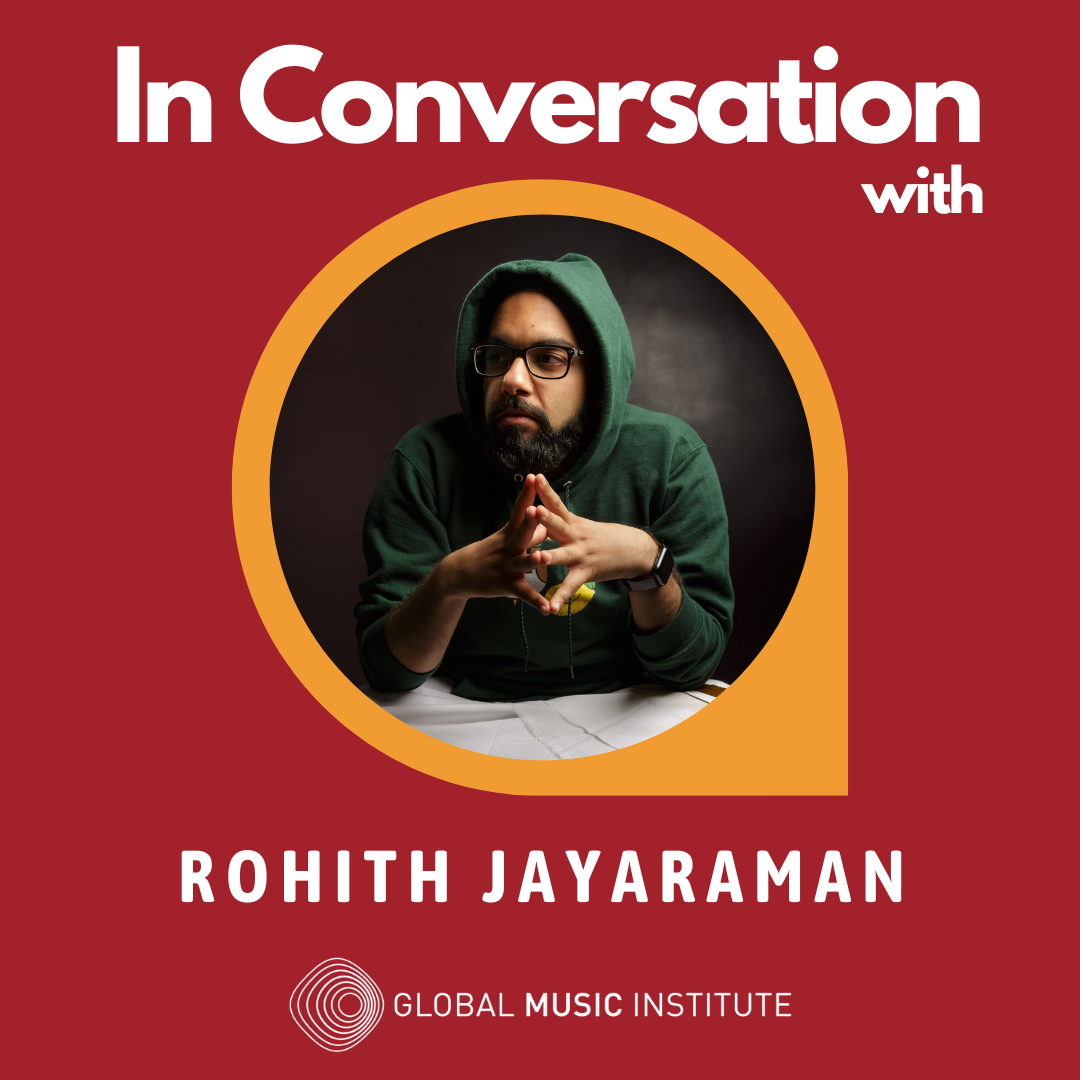
07 Jul In Conversation with Rohith Jayaraman
The ‘In Conversation with’ series brings to you the stories of various creative professionals from the music industry and provides a glimpse into their journeys. Today’s conversation with Rohith Jayaraman covers ground from his early experiences learning Carnatic music in the Bay Area, explorations of identity in and through music, his collaborative album ‘Manam’ and much more.
Early years
Born to immigrant parents in San Jose, California, Rohith Jayaraman is a vocalist, composer, educator, and Associate Director of the Berklee India Exchange. Music has been synonymous with Rohith from day 0, case in point being the story he fondly recalls of his mother going into labour on the day of a gig– one she had to hand over to a sub to bring her firstborn into the world. Upon her move to San Jose Rohith’s mother and guru Asha Ramesh, a disciple of D.K. Jayaraman, carried over remnants of her old world into the new, the most significant bridge being the Carnatic music tradition she would go on to carry forward and grow into a music school – the Ragamalika School of Music– now almost thirty years strong.
Beginning his musical journey under the tutelage of his mother at the age of five, music quickly became a constant companion and outlet for the young Rohith. “I was always the averagest of average students academically and I was not an athletic kid. I had asthma which was both a reason and an excuse to not do sports. My only real outlet that was consistent was music.” A liberating learning environment grounded in values of equality, fairness, and autonomy enabled Rohith to forge his own relationship with the artform. “The great thing was that my parents never pressured me. My mom never did individual classes for me for at least ten years. I was always in a group class with other students and I would learn at the same pace the class learned. She always made sure that I didn’t get special treatment. Only when I was eleven or twelve was when she started to ask if I wanted to do a class separately or learn some advanced stuff. The fact that I always had a choice every step of the way is why I have such a positive association with music learning.”
(Baby Rohith)
Music, Culture, and Identity
Growing up in the Bay Area to Tamil parents, life was a delicate dance between two very different worlds for Rohith– one that forced him to closely examine and renegotiate his musical identity. “Everything in my life was English for the most part and by the time I got to middle school, I was speaking to my parents in English. It’s interesting growing up in the Bay Area because there is a strong immigrant community and strong Indian community. In my early schooling years, there were kids from across India and different parts of the world. But when I got to high school was when there was more of a divide. When I started doing musical theatre in high school, things got much more complicated for me. The community of students doing musical theatre were white American students whose families had been in the US for generations, and that prompted my phase of thinking that maybe I didn’t want to do as much Carnatic music. I was the only Indian kid in our musical theatre program and that carried over with this thing of ‘I’m going to be the guy who doesn’t sing Indian music.’’’
(First music video at Berklee)
Rohith’s mother’s support was crucial in navigating the phase of questioning, trial and error. “When I said to my mom that I wasn’t going to learn Carnatic music anymore, she was cool. She told me to do whatever I wanted to do and to do it to the extent I wanted to do it which was really hard for her. She also encouraged me to do musical theatre which was great.” After the completion of high school, Rohith sang his way into the Berklee College of Music’s undergraduate music therapy program with Nina Simone’s classic ‘Feeling Good’. He recalls the audition as one of the only three instances where he performed music in English.
At Berklee, he found greater comfort and acceptance in his musical heritage and identity. “I think I was just happier singing Indian music. I love listening to non-Indian music but my inclination was always towards the Indian musical vocabulary. I also knew that I had a lot of weaknesses in a purely classical setup. My brain is just not wired to sing purely Carnatic music and that is something that took me a long time to come to terms with.” Early on in his time at Berklee, his reputation as the “guy who sang Indian stuff” grew quickly in the dorm rooms. Soon, he found his tribe– the Berklee Indian Ensemble– performing with whom gave him the opportunity to share stage with musical powerhouses like AR Rahman, Ustad Zakir Hussain, Shreya Ghoshal, Shankar Mahadevan, Vijay Prakash, and Clinton Cerejo.
(5 Peace Band with Shankar Mahadevan)
Manam
In 2021, Rohith and his mother Asha Ramesh released a collaborative album titled ‘Manam’. Speaking about the conception of the album, he says, “I was in Boston during the early pandemic and George Floyd had just been killed. My mom was really shaken up by the video and she had to cancel classes for about a week. She writes lyrics and composes which she has been doing for years for traditional carnatic compositions and to process her emotions, she wrote something in Tamil about colour, caste and religion. She sent it to me and I really loved it and told her that I would love to explore this more. At that point I wasn’t thinking of it as a songwriting exercise. It was more of an exploration.” What began as an organic translation of emotions into music grew into a five-track album ‘Manam’.
Thillana (official music video)
“The process of creating the album was us sitting at home talking about race, gender roles in the Indian and Indian-American community, and examining our relationship with the black community in the United States. My dad, mom and I sat after dinner and chatted for hours. We learned so much and became even closer through this process of talking every night or sometimes yelling at each other every night. We were really nervous when we released the album because a lot of what we talked about wasn’t controversial but just heavy. For us, what we looked at was how much we learned both musically and socially. It really started us on a journey and I met a lot of like-minded musicians through that. Now I think about the music not only in terms of the form itself but also the other parts of the story that are being told.”
Saloni (official music video)
In creating original compositions in Carnatic music, the mother-son duo are challenging longstanding practices in the tradition. “There is not a lot of original composition that happens in Carnatic music… or rather, there is, but it only happens from the top tier performers for the most part. There are only one or two composers from the last hundred years whose compositions have become a part of the performance repertoire. For the most part it’s a bunch of men from 300 years ago whose compositions we all sing today. I strongly believe that if we can inculcate a culture of composition then the perspective gets that much richer because everyone is contributing to what is being said and sung in that tradition and it is not just the perspectives of the people who were around at one point in time. It is representative of the culture now which is generally what music is– all arts tend to be a reflection. With Manam, we also wanted there to be original carnatic music.” By challenging existing norms and creating with courage, Rohith and his mother are inspiring younger generations in the Carnatic tradition to discover and express their own voice and own perspectives.
Reflecting on his personal discoveries from the album, he says, “It’s really interesting because there is a post Manam clarity because I learned a lot about how I see myself as an arranger through that process so my brain is very different when I think about writing for other projects. I don’t know if I’ll do the Manam thing again where I’m writing something that is so lyrically heavy and Carnatic in approach. Manam was the catharsis that the little Rohith needed and now that little Rohith is gone.” With multiple projects in the pipeline including another ‘Hamsa’ with acclaimed violinist-composer Layth Sidiq, Rohith is just getting started.
To tune in to Rohith’s musical offerings, you can follow him on Spotify and Instagram.
Written by Senjuti




Asha Ramesh
Posted at 02:06h, 08 JulyWonderful 👏🏽👏🏽